The year 2024 marks the 60th anniversary of the establishment of diplomatic relations between China and France. Starting from June 18, Professor Regis Malet, a high-level foreign expert from the Faculty of Education and the Laboratory of Culture, Education, and Society of the Faculty of Teacher Education and Training of the University of Bordeaux, France, was invited to our school to carry out a series of lectures and exchange activities on the theme of "French Education, European Education and Educational Globalization" for one month.
Professor Regis Malet is a senior member of the Institut de France, President of the Association for the Study of Comparative Education in Francophonie (AFEC), editor-in-chief of the Francophone international research journal Comparative Education, and co-chair of the Standing Committee on Publications of the World Council of Comparative Education Societies (WCCES). In 2024, he was awarded the title of highest-ranking university teacher by the French National University Council. His main research interests include comparative education, educational policy analysis, teacher education, citizenship and educational research, and he has published extensively in English and French.
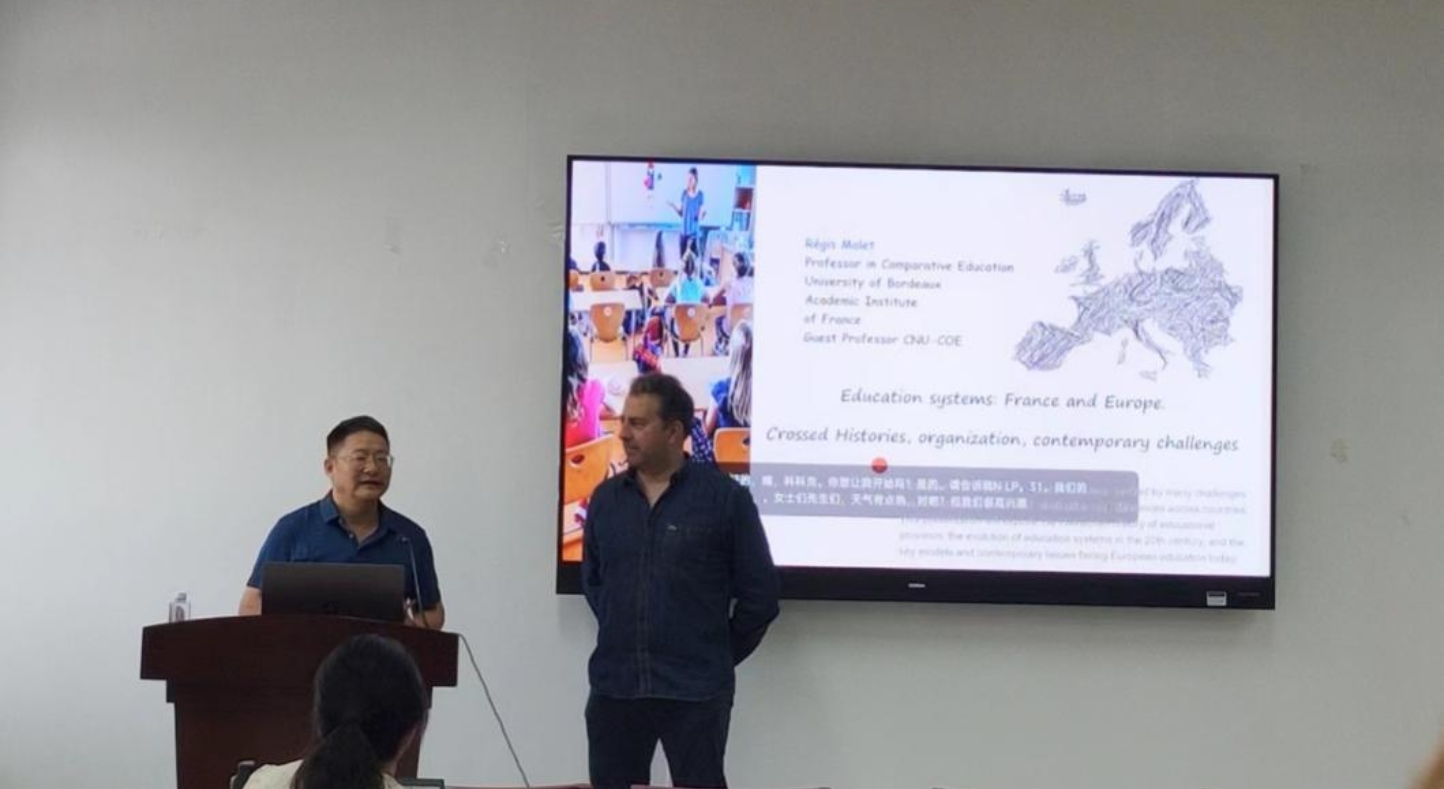
On the morning of June 18, Professor Malet gave the first lecture entitled "French and European Education Systems: Interwoven History, Organizational Structure, and Contemporary Challenges". The lecture was chaired by Professor Ding Bangping, Director of the Institute of International and Comparative Education. Professor Malet reviewed the development of European education since the 18th century, revealing the commonalities and differences of national education systems. From the rise of educational philosophy in the 18th century to the nationalization of education under industrialization and nation-state advocacy in the 19th and 20th centuries, European education has undergone a transformation from enlightenment to popularization. However, this process was also accompanied by wars between 1870 and 1945. After World War II, economic and population growth promoted the expansion of higher education, and the improvement of Franco-German relations laid the foundation for European educational integration. At the beginning of the 21st century, the Bologna Process promoted the unification of the European higher education system, and programs such as Erasmus further facilitated the exchange of talents and knowledge. Professor Malet gave an in-depth analysis of the characteristics of the French education system, including a high degree of centralization, parallel public and private education, and a split secondary education system; he also compared the characteristics of Scandinavian, Germanic, Anglo-Saxon, and Latin educational systems. He pointed out that European education currently faces the challenge of integrating new technologies, lifelong learning, and equity in education. After the lecture, Professor Malet explained and answered the relevant questions of the teachers and students present.
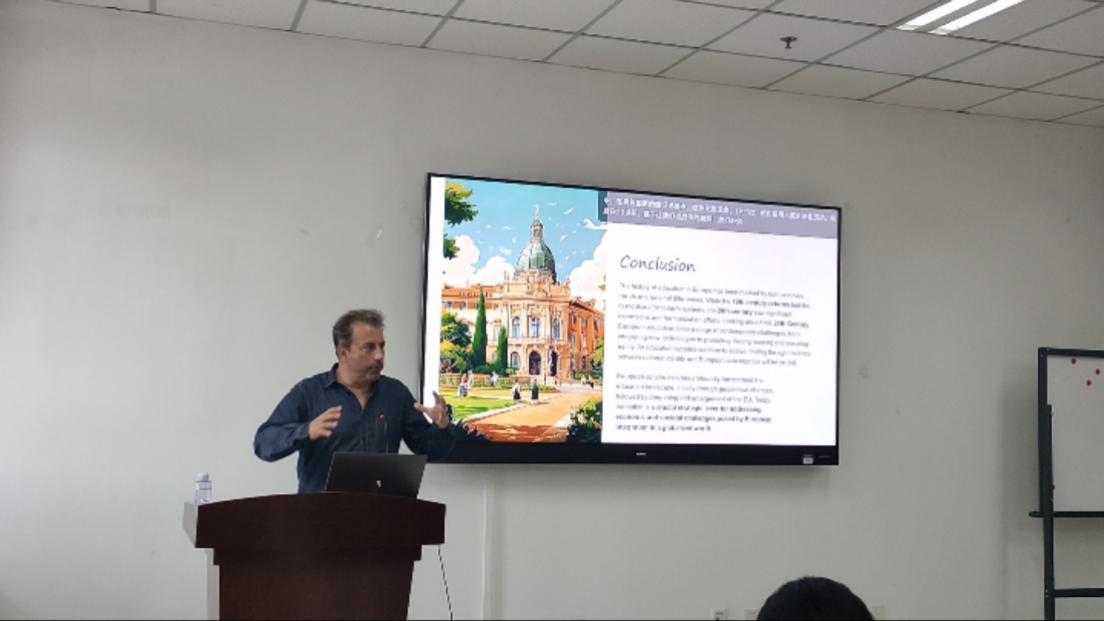
On June 19, Professor Malet's second lecture was "The French School System and Its Teachers: Promises, Obstacles, and Challenges to the Republic's Educational Model". The lecture was moderated by Dr. Zhang Mengqi, Institute of International and Comparative Education. Professor Malet explored the transformation of the French education system from the perspective of the French Revolution of 1789. Before the Revolution, education was controlled by the Catholic Church, the content was biased toward religion, and resources were concentrated in the hands of the elite, resulting in unequal educational opportunities. The Revolution laid the foundation for a secular education system emphasizing equality, freedom, and secular principles, which was further consolidated by the Napoleonic reforms and had a profound impact on the rest of Europe. Three acts in the 19th century had a significant impact on the development of the French education system, especially the Guizot Act and the Ferry Act, which established the compulsory, free, and secular nature of education. The new education movement of the 20th century also had a broad influence on French education. Professor Malet also discussed the current challenges facing education in France, such as educational inequality and high dropout rates, and the lecture ended with a lively discussion.
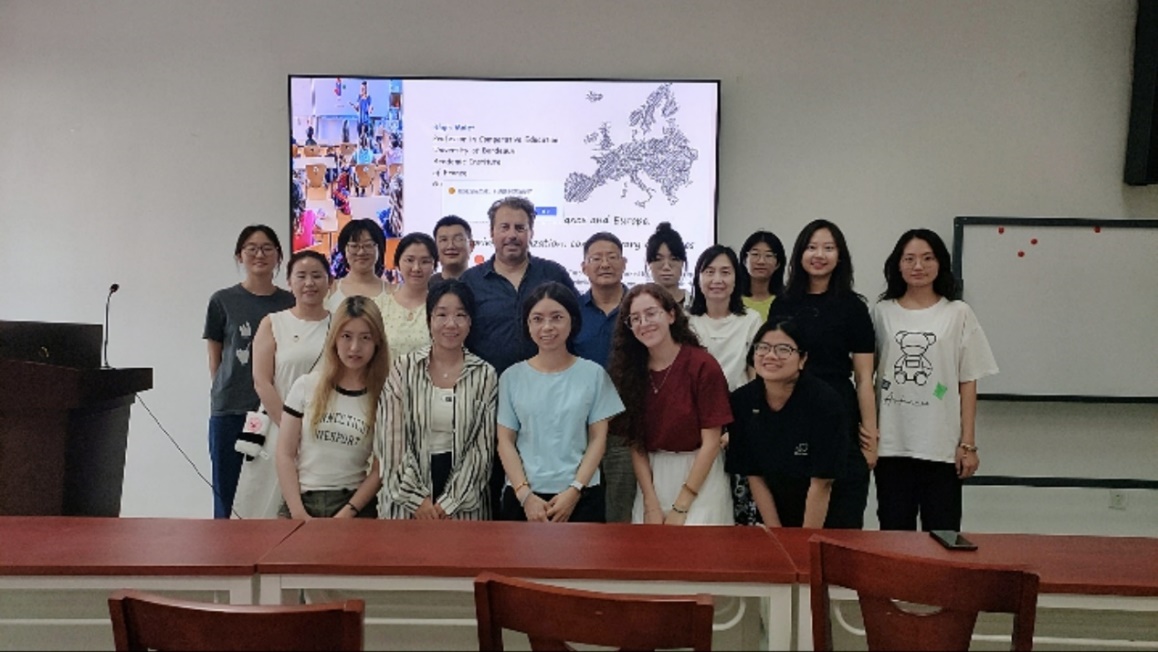
On June 24, Professor Malet gave a keynote lecture entitled "Education in Europe: Structure, Comparison, Convergence, and Challenges". Associate Professor Qiao He from the Institute of International and Comparative Education moderated the lecture. The University of Bordeaux is funded by the French University of Excellence Program. Professor Malet comprehensively introduced the excellent teaching quality of the University of Bordeaux and its coping strategies to face the challenges of educational globalization from the aspects of geographical location, faculty team, department setting, and characteristics of the European education system, which can provide references for the education reform of domestic universities. With its geographical advantages, international study programs, and multidisciplinary university model, the University of Bordeaux attracts students from all over the world to study, of which international students account for 12% of the total student body. In the face of the integration of European education, the University of Bordeaux proposes four innovations: interdisciplinary research, multilingual perspectives (French and English), professional development for teachers and beginners, a blended teaching model aimed at developing students' language skills, a spirit of cooperation and a deeper understanding of the global transformation of education. After the lecture, Professor Malet responded to questions from teachers and students present.
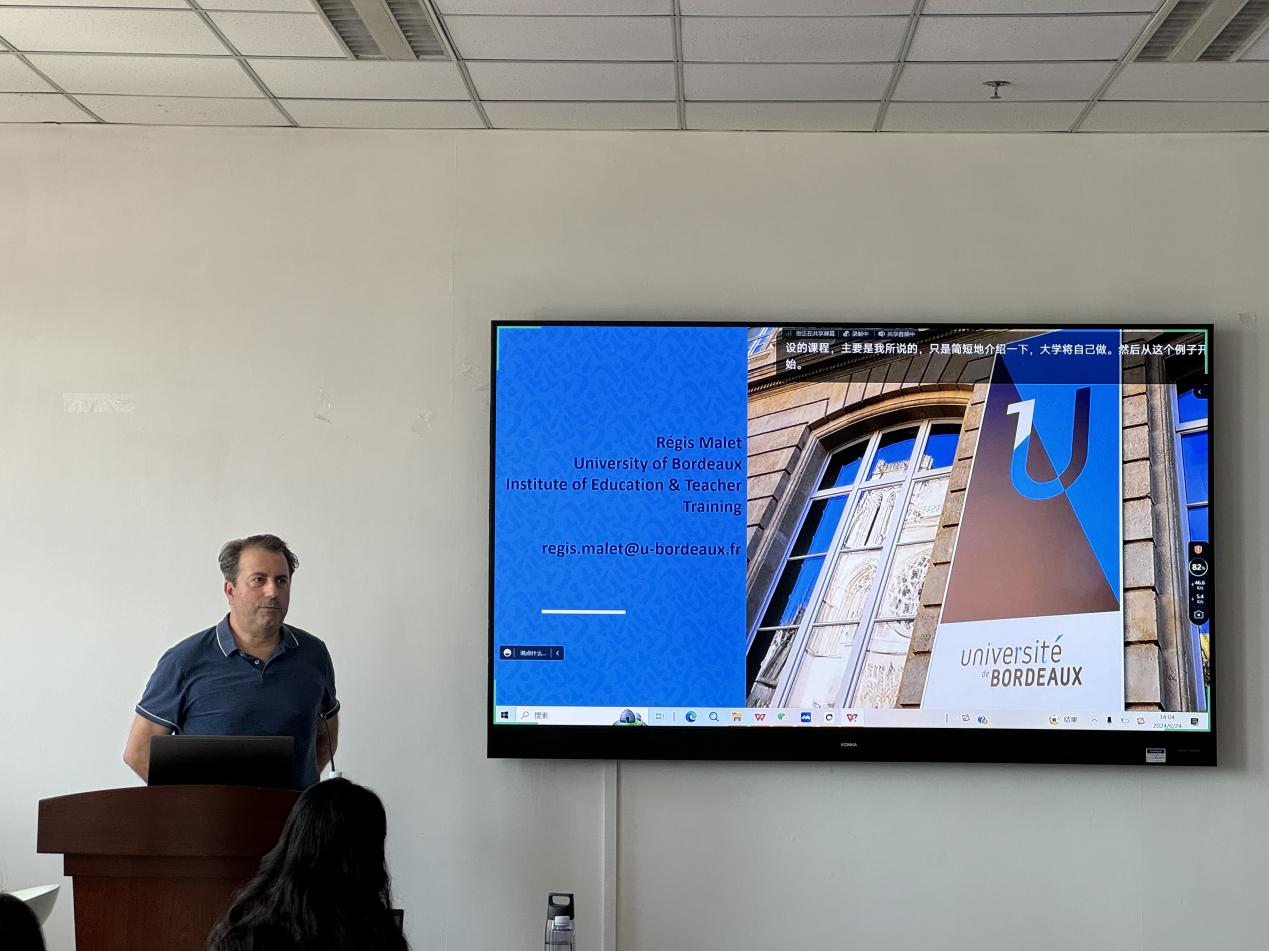
On the morning of June 25, Professor Malet gave a keynote lecture entitled "Education and Globalization: Benchmarks, Knowledge Challenges", which was again moderated by Dr. Zhang Mengqi. Prof. Malet outlined several key issues related to education, globalization and global citizenship, emphasizing that diversity is at the core of global education, that regional citizenship is evolving into global citizenship with the advance of globalization, and that cultivating cross-cultural competence is an effective strategy to adapt to globalization. Professor Malet pointed out that culture is dualistic, that cultural commonality and diversity are the dual forces that unite and divide people, and that it is crucial to understand the root causes of cultural divide, such as ideas, stereotypes and discrimination. Professor Malet stressed that teachers should consciously cultivate students' cross-cultural abilities, such as language ability, difference identification ability, analysis and comparison ability and reflection ability, respect cultural diversity, and adopt appropriate teaching methods according to students' cultural background. Finally, Professor Malet presented the French approach to preparing students between the ages of 6 and 18 to become capable global citizens in a diverse global environment. After the lecture, Professor Malet responded to questions from the faculty and students present.
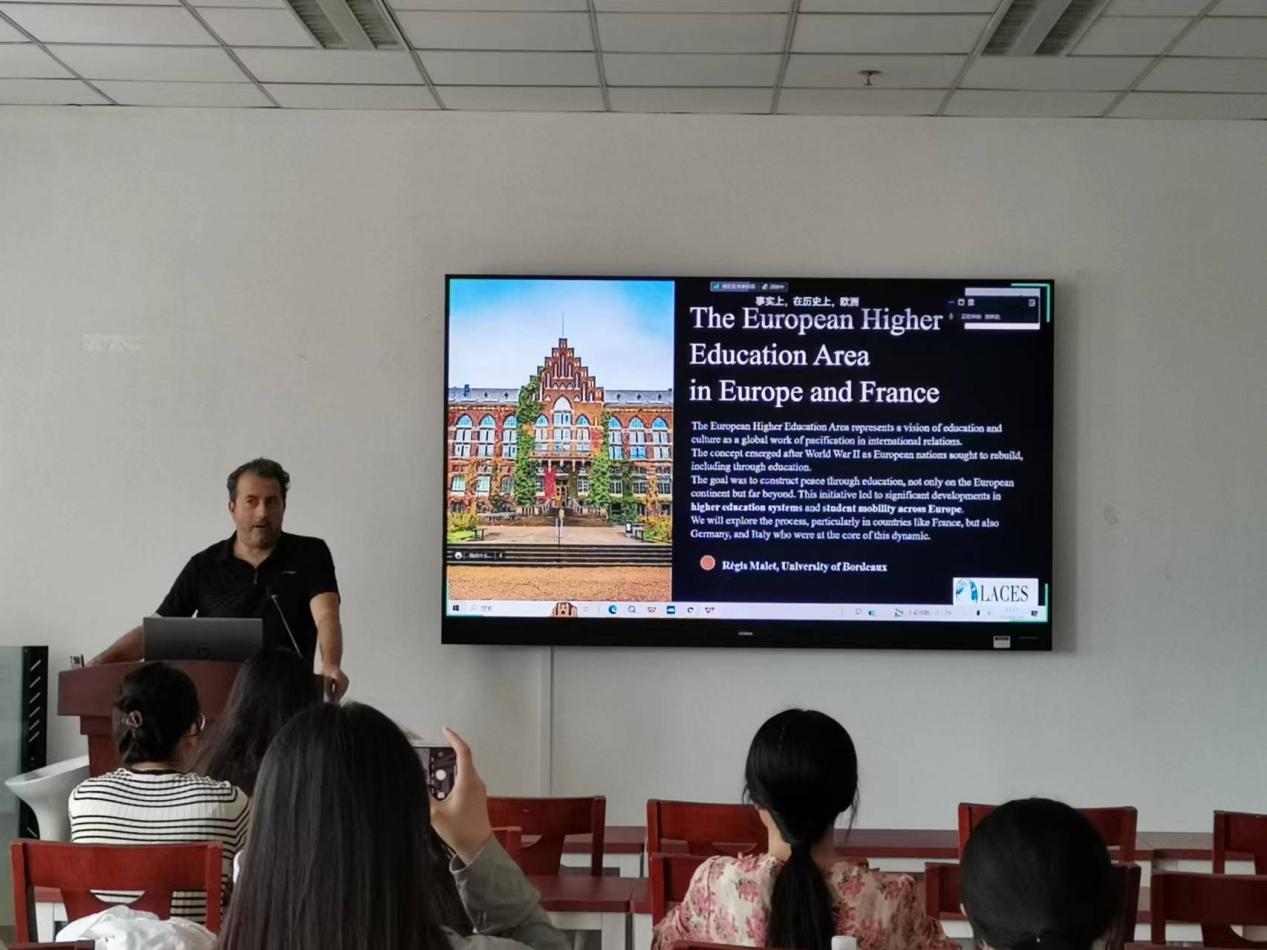
On the afternoon of June 26, Professor Malet gave a keynote lecture entitled "The Transformation of Higher Education in France and Europe". Dr. Zhang Mengqi chaired the lecture. Professor Malet reviewed the educational reform and cooperation in France, Germany, and Italy since the Second World War, and then analyzed the development process of the European Higher Education Area, the evolution of educational policies and key elements. He pointed out that since the 1990s, the four major reforms in European higher education have been LMD reform, school autonomy, internationalization and digitalization. Professor Malet stressed that student mobility is key to the creation of the European Higher Education Area, and that while student mobility reforms have promoted personal and professional development and increased European identity, student mobility still faces challenges such as unequal opportunities, unequal distribution of financial support and low overall participation rates. Finally, Professor Malet explored the impact of student mobility on both sending and receiving countries, emphasizing that education plays an important role in international cooperation as a vehicle for peace and commitment. After the lecture, Professor Malet responded to the relevant questions of the teachers and students present, and encouraged them to learn foreign languages to better understand and carry out international cultural exchanges. This brings to a close a two-week lecture series.
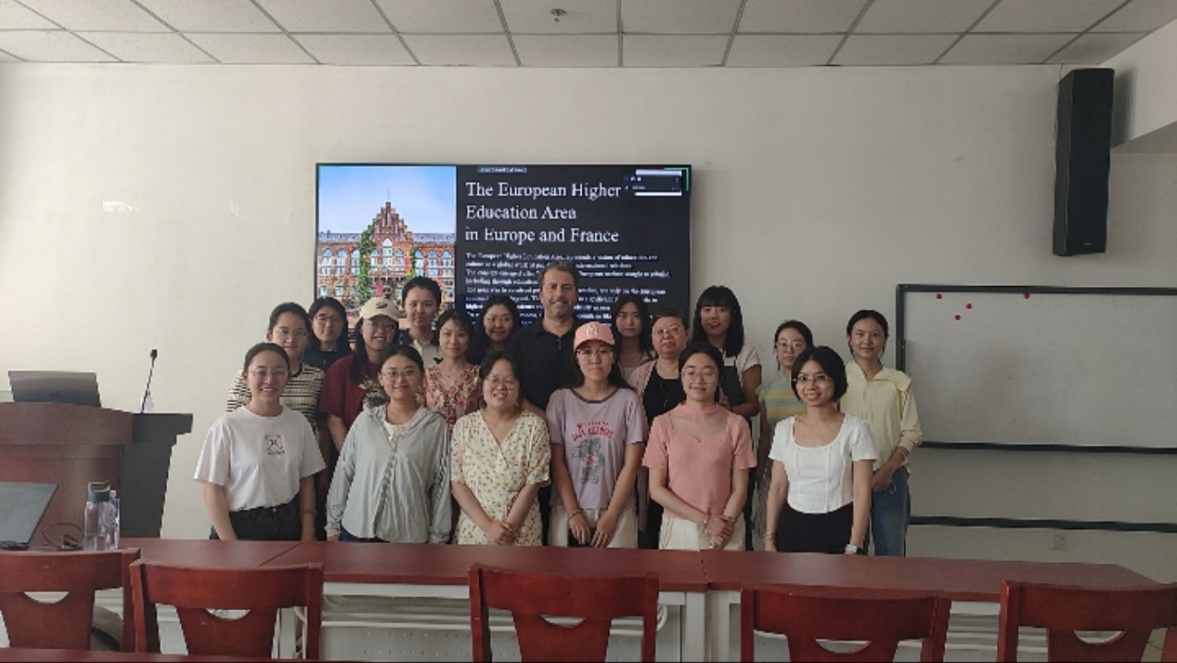
Both China and France have splendid cultures and profound historical deposits, and the friendly exchanges between the two countries have a long history. In the field of educational exchanges, China and France are also pioneers and practical partners. The series of lectures held by the School of Education of Capital Normal University not only strengthens the contact with the international academic community and broadens the international perspective of teachers and students, but also lays a solid foundation for the future cooperation between Capital Normal University and the University of Bordeaux in the fields of education and research. We believe that with the deepening of bilateral cooperation, China and France will achieve more fruitful results in educational cooperation and people-to-people exchanges.
Contributing: LIU Meihan, ZHANG Jiamei, ZHANG Lifang, ZHANG Mengqi
Reviewer: Zhang Mengqi
